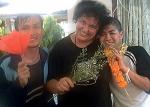An Argument For Travel
Wednesday, October 31st, 2007Neuroscience researchers have concluded that “we can pretend we are free of bias, and avoid thinking about how to deal with our own deeply ingrained tendency to discriminate. Or we can take a lesson from neuroscience, and even from dumb computer agents, which can switch from noncooperation to cooperation if they learn that it is in their best interests.”
“Unconscious biased responses (amygdala activation),” they say, “can be significantly reduced by experience and familiarity.”
Oct. 31, 2007
Robert Burton
Salon.com
We’re Prejudiced, Now What?
Scientists now tell us bias toward others may be innate. But that doesn’t mean we have to behave like Bill O’Reilly.
|
All good people agree,
And all good people say,
All nice people, like Us, are We
And every one else is They
— Rudyard Kipling
I am stuck in rush-hour traffic. Maybe I can find a decent radio program to distract myself from the blasting horns, angry looks and cussing behind rolled-up windows. But the radio is worse than the traffic. On NPR, a Washington think tank guru is arguing that “my 30-plus years of studying the Middle East has convinced me that democracy is more appropriate for some cultures than others.” A second NPR station is airing a debate on the medical rights of “illegal aliens.” On Fox, Bill O’Reilly is talking about a recent dinner in Harlem, N.Y., with Al Sharpton: “I couldn’t get over the fact that there was no difference between Sylvia’s restaurant and any other restaurant in New York City. I mean, it was exactly the same, even though it’s run by blacks.”
Everywhere I turn, someone is honking at the other guy. Once upon a time, when psychology was king of the behavioral hill, I thought that prejudice could be explained by upbringing, cultural influences, socioeconomic disparities and plain old wrong thinking. Despite any hard evidence from soft sciences, I nursed the vaguely optimistic belief that education and the teaching of tolerance might make a dent in the bigotry and racism of “others.” And yet sitting in stalled traffic, I cannot shake the irrational feeling that “those in the other cars” are different from “us in our car.” If my mind seems intent upon making such ludicrous and meaningless distinctions, is there more here than meets the purely psychological I?
[read on]

